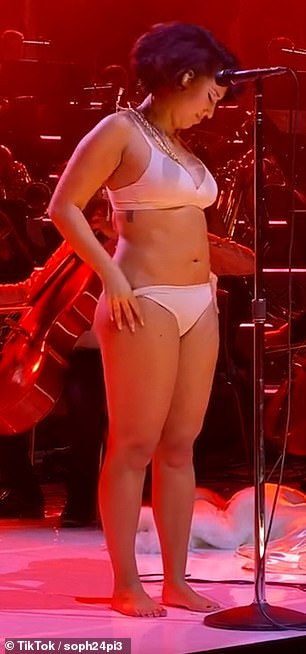Raye strips down to her underwear on stage as she makes a powerful statement about body dysmorphia
Raye stripped down to her underwear to make a powerful statement about body dysmorphia.
The 25-year-old singer was on stage at the Royal Albert Hall for a live album recording on Tuesday when she started taking off her clothes during a performance of her hit Body Dysmorphia.
She has spoken candidly about her battle with the mental health condition – which involves intensely worrying about your appearance – with her candid lyrics, including lines like ‘I’m so hungry, I can’t sleep / But I know if I’m eating / Then I’m on my knees in the bathroom.’
In front of a cheering crowd, Raye took off her corset and pants as she stripped down to a white bra and panties, holding herself as she belted out the emotional lyrics.
She remained in her underwear to perform her next song, Ice Cream Man, about sexual assault, telling the audience: “I’m taking my clothes off at the Royal Albert Hall!”
Powerful: Raye stripped down to her underwear during Tuesday’s show at the Royal Albert Hall to make a powerful statement about body dysmorphia


Stripping: The singer, 25, was on stage for a live album recording when she started taking off her clothes during a performance of her hit Body Dysmorphia
Raye detailed her experience in an Instagram post after the show, writing, “The show of my ENTIRE CAREER, I can’t handle this. I’m going crazy thinking about this show, and yes, I’m posting the reviews because we have five crazy stars across the board.
‘Headlining a sold-out Royal Albert Hall, accompanied by @heritageorchestra and the beautiful talents of the youth choir that is @flamescollective_, conducted and arranged by the monster genius that is @wakeuptom.
‘I CAN’T BELIEVE THIS IS MY REAL LIFE, AFTER ALL THE YEARS OF PRESSURE AND MONTROUS DREAMS, my city saw me as the artist I really want to be and will continue to strive for.
‘Thank you to Pete @moombaproductions for dedicating 10 years of your life to pouring your heart into my project through thick and thin, when I didn’t even have money to pay you what you earned from @jonny_famous because he ridiculed my shows to the audience, my insanely beautiful tour family my goooooooodnesssssssss I will NEVER EVER EVER EVER FORGET THIS NIGHT as long as I live (sic).”
Raye previously spoke about her battle with body dysmorphia after she was asked on Capital FM ‘what do you see when you look in the mirror?’
She explained, “I don’t know. It’s a very 50/50 experience. Perhaps many people can relate to this. Sometimes you look in the mirror and think ‘that’s nice’ or ‘that’s good’, and sometimes it feels like the opposite.
‘But that’s okay, it’s just part of life and I think it’s something I’m working hard on.
‘I don’t think it’s good to spend too much time in the mirror, otherwise you’re just going to point out all the flaws. I just use music as therapy to process things.’

Success Story: Raye’s album My 21st Century Blues is Raye’s first project after her departure from Polydor Records in 2021
Raye’s album My 21st Century Blues is Raye’s first project following her departure from Polydor Records in 2021.
The singer addresses substance abuse, abuse and sexual violence and fear in her lyrics, and previously explained why she did not want to avoid ‘difficult’ topics.
She told MailOnline: ‘I just want to be a woman who discusses uncomfortable topics that we don’t talk about, these are all things I struggled with in the dark and in silence.
“You just hope by writing about these songs and putting them out into the world, you just hope that people hear them and relate to them as well.
‘It’s very much a drug, in a way that makes you feel differently, to add quite a painful emotion to it.
“For me, it’s just very empowering, and I hope it can be a medicine for everyone who needs it.”
While the process of writing the songs was cathartic, it also led to candid and candid conversations with her loved ones — some of whom had no idea she had battled demons.
They were songs Raye had been working on for years but was unable to do while she was embroiled in a battle with her old label Polydor, who she says “controlled and manipulated” her.
Until 2021, outsiders saw Raye – who first rose to fame for her role on Jonas Blue’s 2016 single By Your Side – flourishing after having seven top 20 hits to her name and songwriting credits for Beyonce, John Legend and Charli XCX.
But she felt trapped in a four-album recording contract with no album to her name.
She informed the world of her situation in a strongly worded tweet she posted when she had “reached breaking point” and was able to leave her label last year.
For help and support with eating disorders, contact Beat at beatingdisorders.org.uk
